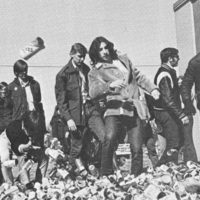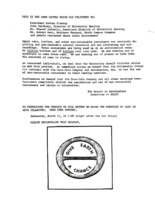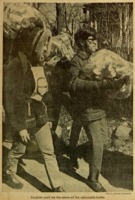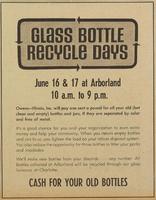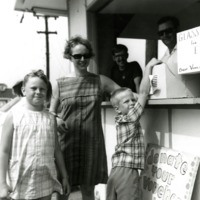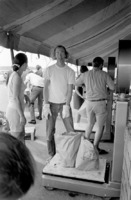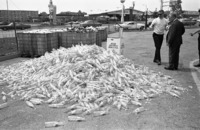See a related article from the Ecology Center's website, The Frontier of Recycling
2. Early Recycling Demonstrations
In the late 1960s, the budding environmental movement was driven by a belief in the wastefulness of modern life, a condition epitomized by the non-returnable beverage container. As the production of single-use bottles and cans increased, the containers began littering fields, streets, and landfills in cities all around the country. Expressing a common concern, the Ecology Center's first director William Kopper remarked to the Michigan Daily, “We can no longer continue to live in a ‘throw-away’ world where our natural resources go on a one-way trip from the land to our air, water, and dumps.” The activists who led the Teach-In and founded the Ecology Center believed that recycling throwaway beverage containers was a good place to start.
In March 1970, just before the Teach-In on the Environment at the University of Michigan, ENACT sent this open letter to U-M’s administration demanding “that the University change its contract with the Coca-Cola Company and Servomaton, Inc. to ban the use of non-returnable containers in their vending machines.” Backing this demand with action, ENACT coordinated a protest on the second day of the Teach-In during which nearly 200 students dropped more than 10,000 non-returnable cans on the front lawn of the Ann Arbor Coca-Cola Bottling Company.
Through demonstrations like this one, the Teach-In succeeded in drawing attention to the precarious state of the environment. But to truly make a difference, those who led the Teach-In knew they had to do more than protest. By founding the Ecology Center, ENACT created a place where concerned students and Ann Arborites alike could learn about the state of the environment and work together to solve the environmental problems facing their communities.
One of the Center’s earliest goals was to create a glass recycling program. However, it could be expensive to set up this kind of program, and, especially during the Ecology Center’s first few months of operation, its leaders’ ambitions were larger than the size of their budget. For this reason, the Ecology Center partnered with Owens-Illinois Glass Company of Toledo, Ohio to host a recycling event at the Arborland Shopping Center which they called Glass Recycle Days. This event, they hoped, would demonstrate that it was possible to create a permanent glass recycling program in Ann Arbor.
On June 16th and 17th, 1970, more than 30,000 “well-groomed housewives in station wagons, straw-hatted farmers in pickups and ragged-haired kids towing wagons” hauled over 250,000 glass bottles to Arborland, according to the Detroit Free Press. ENACT student volunteers collected the bottles, weighted them, and sorted them by color. Contributors received one penny per pound of glass they brought to the station, financed by Owens-Illinois. In turn, these contributors donated about one-fifth of their earnings back to the fledgling Ecology Center.
In just two days, community service groups, families, and people concerned about the environment brought over 65 tons of glass to the station from Ann Arbor and the surrounding communities. A Methodist youth group from New Hudson, Michigan made the largest contribution, carting 2,935 pounds of glass to the station. An Owens-Illinois press relations representative told the Michigan Daily that the company had previously accepted glass for recycling, however, the program was its “first attempt to reclaim glass outside of factory towns.”
Encouraged by the community’s response to this event, Owens-Illinois decided to partner with the Ecology Center to establish a permanent recycling station in Ann Arbor, one of the first in the nation.

